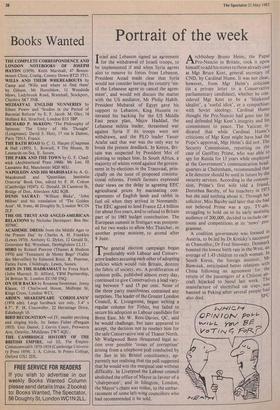Portrait of the week
Israel and Lebanon signed an agreement for the withdrawal of Israeli troops, to be implemented if and when Syria agrees also to remove its forces from Lebanon, President Assad made clear that Syria would not consider leaving the country 'un- til the Lebanese agree to cancel the agree- ment', and would not discuss the matter with the US mediator, Mr Philip Habib. President Mubarak of Egypt gave his support to Lebanon, King Hussein re- iterated his backing for the US Middle East peace plan, Major Haddad, the Lebanese militia leader, threatened war against Syria if its troops were not withdrawn, and the PLO leader Yasser Arafat said that war was the only way to break the present deadlock. In Kenya, Bri- tain was suspected by President Moi of plotting to replace him. In South Africa, a majority of whites voted against the govern- ment in by-elections in the Transvaal, prin- cipally on the issue of proposed constitu- tional reforms. French farmers expressed their views on the delay in agreeing EEC agricultural prices by marinating con- signments of English lamb and rabbit in fuel oil when they arrived in Normandy. The EEC agreed to lend France £2.4 billion for about five years, and to refund to Britain part of its 1983 budget contribution. The European summit in Stuttgart was postpon- ed for two weeks to allow Mrs Thatcher, or another prime minister, to attend after 9 June.
he general election campaign began 1 predictably with Labour and Conserv- ative leaders accusing each other of adopting policies which would ruin Britain, destroy the fabric of society, etc. A proliferation of opinion polls, published almost every day, continued to give Conservatives a lead vary- ing between 7 and 15 per cent. None of the three party manifestoes contained any surprises. The leader of the Greater London Council, K. Livingstone, began writing a regular column for Titbits, but failed to secure his adoption as Labour candidate for Brent East. Mr W. Rees-Davies, QC, said he would challenge, but later appeared to accept, the decision not to reselect him for the safe Conservative seat of Thanet North. Mr Wedgwood Benn threatened legal ac- tion over possible 'issues of corruption' arising from a telephone poll conducted by the Sun in his Bristol constituency, ap- parently not realising that the poll suggested that he would win the marginal seat without difficulty. In Liverpool the Labour council abolished the office of Mayor in favour of a 'chairperson', and in Islington, London, the Mayor's chain was stolen, to the embar- rassment of some left-wing councillors who had recommended it be sold. Archbishop Bruno Heim, the Papal Pro-Nuncio in Britain, took it upon himself to add his stones to those already cast at Mgr Bruce Kent, general secretary of CND, by Cardinal Hume. It was not clear, however, from Mgr Heim's criticism (in a private letter to a Conservative parliamentary candidate), whether he con- sidered Mgr Kent to be a 'blinkered idealist', a 'useful idiot', or a sympathiser with Soviet ideology. Cardinal Hume thought the Pro-Nuncio had gone too far and defended Mgr Kent's integrity and his commitment to peace. The Vatican in- dicated that while Cardinal Hume's criticisms of Mgr Kent might have had the Pope's approval, Mgr Heim's did not. The Security Commission, reporting on the case of Geoffrey Prime, who was able to spy for Russia for 13 years while employed at the Government's communication head- quarters at Cheltenham, recommended that a lie detector should be used in future by the security services. According to the commis- sion, Prime's first wife told a friend, Dorothea Barsby, of his treachery in 1973 but she said nothing about it. Through her solicitor, Miss Barsby said later that she had not believed Prime was a spy. TV-am, struggling to hold on to its early morning audience of 200,000, decided to include car- toons and competitions in its 'news' pro- gramme.
A coalition government was formed in Austria, to be led by Dr Kreisky's successor as Chancellor, Dr Fred Sinowatz. Denmark boasted the lowest birth rate in the West, an average of 1.43 children to each woman. In South Korea, the foreign minister, Mr Bum-suk, anticipated better relations with China following an agreement for the return of the passengers of a Chinese air- craft hijacked to Seoul last week. The manufacture of electrified rat traps was banned in Peking after several people had










































 Previous page
Previous page